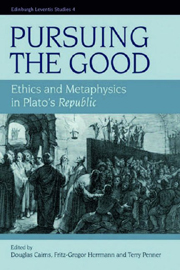Book contents
- Frontmatter
- Contents
- Preface
- Contributors and Editors
- Introduction
- 1 What is the Form of the Good the Form of? A Question about the Plot of the Republic
- 2 Glaucon's Challenge, Rational Egoism and Ordinary Morality
- 3 Thrasymachean Rulers, Altruistic Rulers and Socratic Rulers
- 4 Neutralism in Book I of the Republic
- 5 The Good, Advantage, Happiness and the Form of the Good: How Continuous with Socratic Ethics is Platonic Ethics?
- 6 The Form of the Good and the Good in Plato's Republic
- 7 Flourishing: The Central Concept of Practical Thought
- 8 Is Plato's Conception of the Form of the Good Contradictory?
- 9 The Good, Essences and Relations
- 10 The Idea of the Good and the Other Forms in Plato's Republic
- 11 The Aporia in the Charmides about Reflexive Knowledge and the Contribution to its Solution in the Sun Analogy of the Republic
- 12 The Good and Mathematics
- 13 The Good and Order: Does the Republic Display an Analogy Between a Science of Ethics and Mathematics?
- 14 Inquiry and Justification in the Search for the Highest Good in Plato and Aristotle
- 15 The Carpenter and the Good
- 16 Conversion or Conversation? A Note on Plato's Philosophical Methods
- Index
13 - The Good and Order: Does the Republic Display an Analogy Between a Science of Ethics and Mathematics?
Published online by Cambridge University Press: 12 September 2012
- Frontmatter
- Contents
- Preface
- Contributors and Editors
- Introduction
- 1 What is the Form of the Good the Form of? A Question about the Plot of the Republic
- 2 Glaucon's Challenge, Rational Egoism and Ordinary Morality
- 3 Thrasymachean Rulers, Altruistic Rulers and Socratic Rulers
- 4 Neutralism in Book I of the Republic
- 5 The Good, Advantage, Happiness and the Form of the Good: How Continuous with Socratic Ethics is Platonic Ethics?
- 6 The Form of the Good and the Good in Plato's Republic
- 7 Flourishing: The Central Concept of Practical Thought
- 8 Is Plato's Conception of the Form of the Good Contradictory?
- 9 The Good, Essences and Relations
- 10 The Idea of the Good and the Other Forms in Plato's Republic
- 11 The Aporia in the Charmides about Reflexive Knowledge and the Contribution to its Solution in the Sun Analogy of the Republic
- 12 The Good and Mathematics
- 13 The Good and Order: Does the Republic Display an Analogy Between a Science of Ethics and Mathematics?
- 14 Inquiry and Justification in the Search for the Highest Good in Plato and Aristotle
- 15 The Carpenter and the Good
- 16 Conversion or Conversation? A Note on Plato's Philosophical Methods
- Index
Summary
In his chapter in this volume, Christopher Gill discusses three ways in which to understand the elusive relationship between ethical ideas and the mathematical terms in which Plato describes them in the Republic. According to Gill, a satisfactory explanation of this relationship should both account for Platonic texts on mathematics and ethics and avoid the twin dangers Gill calls ‘Scylla’ and ‘Charybdis’: on the one hand, so technical an account of the mathematical terms as to make them inapplicable to ethical matters, and on the other hand, an account of the mathematical terms as merely metaphorical, that is, as having no determinately mathematical character. (Gill's worry that in the ‘Scylla’ case the mathematical ideas ‘can be applied equally to almost any ethical theory’, p. 252, is misleading since the problem is one of the mathematical terms' inapplicability to ethics rather than of their overapplicability.) Avoiding Scylla and Charybdis requires, then, that the relationship between mathematical and ethical ideas be intelligible in both mathematical and ethical terms, while the ideas remain determinately mathematical or ethical.
According to the first of the accounts of the ethical–mathematical relationship discussed by Gill (Myles Burnyeat's), mathematics studies in abstraction the very same structures, such as concord and unity, which make a soul and a city and the cosmos good. This is why a mathematical education is at the same time an education in value. Gill faults Burnyeat for not taking sufficient account of the fact that Plato's programme of education begins with the formation of appropriate beliefs about right or fine action, and concludes with Socratic-style dialectic about virtues and the good – discussed in these, rather than in metamathematical, terms (pp. 260–2).
- Type
- Chapter
- Information
- Pursuing the GoodEthics and Metaphysics in Plato's Republic, pp. 275 - 278Publisher: Edinburgh University PressPrint publication year: 2007



